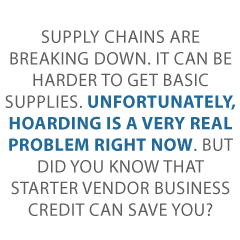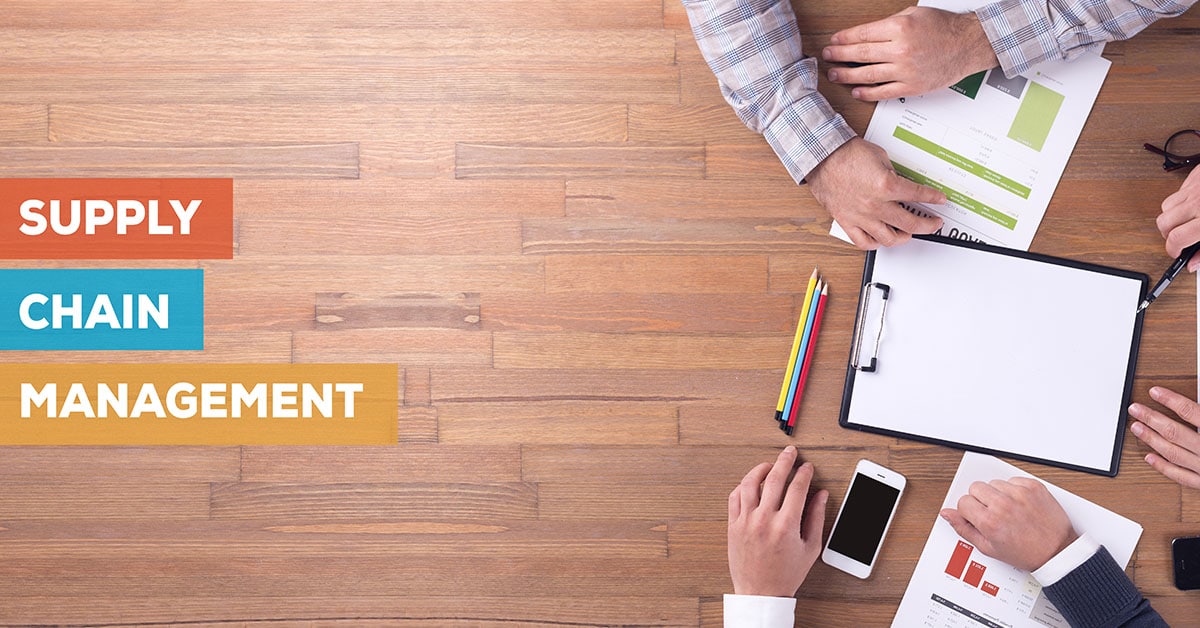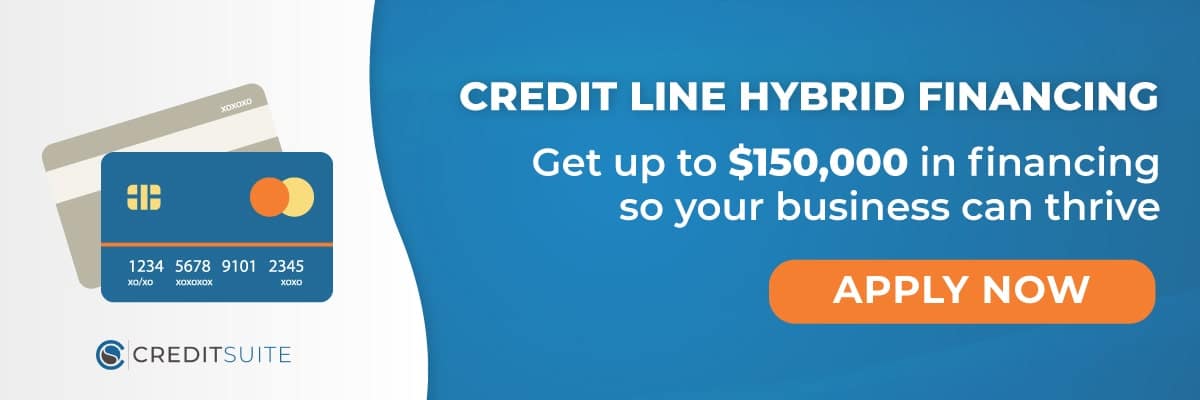- Connect With Us!
- (877) 600-2487
- info@creditsuite.com
Recession Supply Chain Management in the Era of COVID-19
Published By Janet Gershen-Siegel at April 3rd, 2020
Conditions are changing on the fly. It’s hard to find certain products on the shelves. COVID-19 (the novel coronavirus) has utterly disrupted the supply chain. This is so even if you never received products or raw materials from Asia. And with the economy slipping, a recession seems a certainty. You need recession supply chain management.
Suddenly, You Need to Concern Yourself with Recession Supply Chain Management
Our world of business has changed. Right now, business owners are more concerned than ever before. Many are uncertain of what to do. It’s a time to be wondering about how to get the capital you need to grow, and whether it’s possible to survive and thrive. But you can!
Everything is Moving FAST These Days
Conditions are changing on the fly. Several states have already closed restaurants and bars and other nonessential businesses. Others are limiting gatherings, if they can get people to listen and do as requested. Still others have lockdowns in place. Stores are having trouble keeping stock on the shelves. Customers and prospects are getting jittery. But you can still build business credit. In fact, you should.
Supply chains are breaking down. If you get goods from China, they you’re already feeling the pinch. This includes if you only get one raw material from China. It can be harder to get basic supplies. Unfortunately, hoarding is a very real problem right now. But did you know that starter vendor business credit can save you?
Building Recession Supply Chain Management Right into Business Credit Building
Here’s how business credit is built. Having an EIN doesn’t mean you have established credit. If you go to a bank to try and get credit using your EIN with no credit established, you’ll ALWAYS get denied, guaranteed! That is unless you have good personal credit and use it for approval while supplying your personal guarantee. It doesn’t have to be that way. Now is the perfect time to get rolling with business credit. Take advantage of changed circumstances and strike while the iron is HOT.
Let’s look at building business credit the right way. You cannot start with high limits. First you must build starter trade lines that report (vendor credit). Then you’ll have an established credit profile. Then you’ll get a business credit score. With an established business credit profile and score you can start getting high credit limits. Acting now can only help you later.
Recession Supply Chain Management with Starter Vendor Credit
What is starter vendor credit? These trade lines are creditors who will give you initial credit when you have none now. These are often vendors who can give you basic business supplies such as shipping boxes, Outdoor work wear, Ink and toner, Office Furniture, and yes, paper goods! They often offer terms such as Net 30, instead of revolving. However, there are some revolving accounts which are still considered to be starter vendors.
Details
Here are the typical details on vendor credit accounts. So, if you get approval for $1,000 in vendor credit and use all of it, you must pay that money back in a set term, such as within 30 days on a Net 30 account, or 60 days for a Net 60 accounts. Unlike with revolving accounts, you have a set time when you must pay back what you borrowed or the credit you used. To start your business credit profile the right way, you need to get approval for vendor accounts that report to the business credit reporting agencies. Once that’s done, you can then use the credit, pay back what you used, and the account goes on report to Dun & Bradstreet, Experian, or Equifax.
Once on report, then you have trade lines, and an established credit profile and score. With your newly established business credit profile and score, you can then get approval for more credit under your EIN. For vendor credit, you can leave your SSN off of the application. Then the credit issuer then pulls your EIN credit, sees a solid profile and score, and can then approve you for more credit. No matter what the economy is doing, this is very doable.
Not Using Your Social Security Number
Let’s look at what it means when you’re not using your Social Security Number. You can’t leave your SSN off bank loan applications or many other credit applications, if that credit is ultimately issued by a bank. This is because federal law requires a Social Security number on the application. It’s to prevent fraud. But for starter vendors, so long as it’s not through a bank, you can leave your SSN off the application. Just leave that field blank. Don’t fill in any other number, because if you do so, you’ve just broken two federal laws.
Learn more here and consult with us about getting started toward growing small business credit in a recession.
Starter Vendor Credit Benefits and How They Can Help You with Recession Supply Chain Management
Check out these starter vendor credit benefits. Vendor Credit is an important step in building business credit. Vendor Credit is easier to get than store or fleet credit. It can lead to more credit. Establishing credit will lead to lenders approving you. This process is proven to work! As we pause and regroup, it’s the perfect opportunity to build starter vendor credit.
Consider the process of building business credit. You will need to have credit to get more credit. Getting initial credit is the hardest part. Many trade vendors who issue credit don’t report it to the business reporting agencies – as in over 90%! So, you must find sources which actually report.
Vendor Credit to the Rescue for Better Recession Supply Chain Management
Here are three Companies which provide vendor credit and report to the business credit reporting agencies: Uline, Quill, and Grainger Industrial Supply.
And they can ALL help you get basic supplies, no matter how well your current supplier is stocked.
Uline
We talk about Uline a lot, and it’s for very good reasons. They sell shipping, packing and industrial supplies. They report to Dun & Bradstreet and Experian. You must have a D-U-N-S number and an EIN before starting with them. You need for an order to be $50.00 or more before they’ll report it. Your first few orders might need to be pre-paid to initially so your company can get approval for Net 30 terms.
To qualify, you need an entity in good standing with Secretary of State, your EIN number with the IRS, your business address (matching everywhere), a D-U-N-S number, your business license (if applicable), and a business bank account. Your application may get approval for net 30 at time of order. Upon final review, their Credit Department may change to a few prepaid orders, before granting Net 30.
How Can Uline Help You with Recession Supply Chain Management?
Here’s how Uline can help. Among many other things, they sell toilet paper and paper towels. You can get retail bags. New Hampshire, for example, is going to single-use to slow transmission of COVID-19. Other states may follow suit. But you may have to wait a few weeks to get your delivery. This is not usual for them, it’s just the current circumstances. Deliveries should speed up in the future. Note: due to high demand, you can only order nitrile gloves if you already have ordered them from Uline before. You can visit them at: uline.com.
Learn more here and consult with us about getting started toward growing small business credit in a recession.
Quill
Let’s look at Quill. They sell handheld computers, shipping supplies, cleaning supplies, and more. They report to Dun & Bradstreet. If you are not given a Net 30, they will ask you to do prepaid orders of $100.00. Normally any prepaid order won’t report. So you need for them to have given you a Net 30 account. Net 30 accounts require a $50.00 purchase to report.
To qualify, you need an entity in good standing with Secretary of State, your EIN number with the IRS, your business address (matching everywhere), a D-U-N-S number, your business license (if applicable), and a business bank account. A new business or businesses with no credit history may need to prepay until Net 30 approval.
How Can Quill Help You with Recession Supply Chain Management?
Here’s how Quill can help. Among many other things, they sell hand sanitizer, paper towels, and toilet paper. Due to high demand, delivery may be slower than usual. Currently, their $45 minimum for free shipping has been waived. Right now, everything they sell is shipping for free. You can visit them at: quill.com.
Grainger Industrial Supply
Check out Grainger Industrial Supply. They sell hardware, power tools, electrical supplies, pumps and more. And they also do fleet maintenance. They report to D&B. Orders must be $50.00 or more to go on report. Terms are Net 30.
To qualify, you need an entity in good standing with Secretary of State, your EIN number with the IRS, your business address (matching everywhere), a D-U-N-S number, your business license (if applicable), and a business bank account. They may ask for additional documents for approval. If a business doesn’t have an established credit, they will require additional documents like accounts payable, income statement, balance sheets, etc.
How Can Grainger Industrial Supply Help You with Recession Supply Chain Management?
Here’s how Grainger can help. Grainger remains committed to staying open. They’re currently sold out of hand sanitizer, and a lot of their face masks are sold out, but they do have toilet paper, Lysol, and rubbing alcohol. Some delivery estimates are faster than others. You can visit them at: grainger.com.
Recession Supply Chain Management: The Upshot
Times are changing rapidly. But one constant in life is business credit building. Starter vendors can supply a lot of what you need right now. So consider changing your supply chain and build business credit while weathering the current storm. Get paper goods, cleaning supplies, and so much more. Our Business Finance Suite has even more starter vendors. We’re all in this together.
Learn more here and consult with us about getting started toward growing small business credit in a recession.

 " class="attachment-blog-single size-blog-single wp-post-image" alt="Get Business Credit Cards for New Businesses Credit Suite-Business Line of Credit Decoded" title="Get Business Credit Cards for New Businesses">>
" class="attachment-blog-single size-blog-single wp-post-image" alt="Get Business Credit Cards for New Businesses Credit Suite-Business Line of Credit Decoded" title="Get Business Credit Cards for New Businesses">>